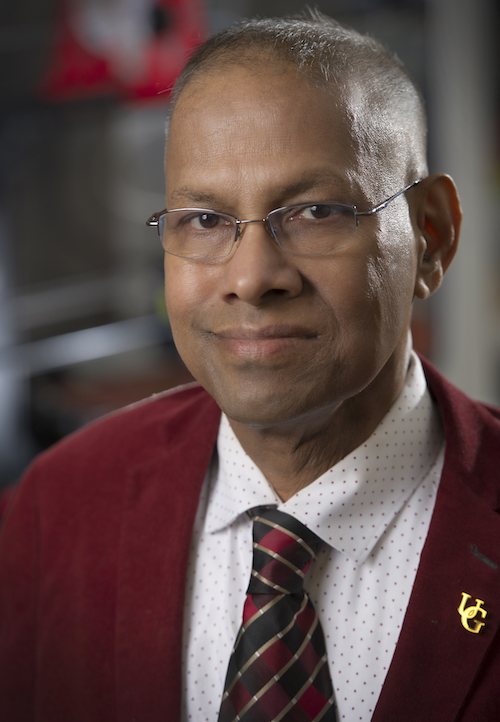
A world-renowned University of Guelph scientist has been honoured by the Royal Society of Canada (RSC) for research helping to reduce the environmental impacts of plastics in Canada and abroad.
Dr. Amar Mohanty, director of U of G’s Bioproducts Discovery and Development Centre (BDDC) and an internationally recognized leader in bioplastics and biocomposites used in everything from car parts to consumer goods, is this year’s recipient of the prestigious Miroslaw Romanowski Medal.
The annual award recognizes significant scientific contributions toward solving environmental problems or improving ecosystem quality. Established in 1994 and named for internationally renowned metrologist Miroslaw Romanowski, the medal also includes a lecture series for the award recipient.
“I am humbled and deeply honoured to receive the Miroslaw Romanowski Medal,” said Mohanty, a professor in the Department of Plant Agriculture who is cross-appointed to the School of Engineering. “It is a significant recognition for my research group members and all collaborators, funders and industry partners, past and present, who have been working to address environmental problems.
“I take this as encouragement of our efforts here at the BDDC to advance scientific discoveries toward commercialization of new bioproducts for societal uses and to mitigate climate change.”
A Fellow of the RSC, he holds the Distinguished Research Chair in Sustainable Biomaterials in the Ontario Agricultural College and is a Fellow of the American Institute of Chemical Engineers, the U.K. Royal Society of Chemistry and the Society of Plastic Engineers.
A highly cited researcher, Mohanty has more than 800 publications, including more than 400 peer-reviewed journal articles, and more than 60 patents.
“Dr. Amar Mohanty and his team are pioneering development of plant-based biomaterials for numerous uses while helping reduce the environmental impact of plastics,” said Dr. Malcolm Campbell, vice-president (research).
“The Miroslaw Romanowski Medal from the Royal Society of Canada recognizes world-leading bioproducts discovery and development that benefits consumers, farmers and the environment.”
The BDDC is developing eco-friendly products from sustainable sources, notably packaging made from biodegradable materials as well as durable materials such as lightweight auto parts and building structures.
The team’s innovations include development of the world’s first certified 100-per- cent compostable coffee pod and a biocarbon headlamp housing that replaces heavy metal parts in cars.
Recently, the team developed a process using biodegradable polymers to create ultra-high oxygen-barrier packaging.
“This can have enormous potential in extending the shelf life of food, reducing food waste with a compostable solution,” said Mohanty. “The technology will be a viable solution to combat the plastic waste problems while creating a cost-effective model to lower greenhouse gas emissions and fight climate change.
“All our projects support better utilization of available resources and circular economy principles.”
He added that development of compostable materials supports Canada’s plan for zero plastic waste, particularly single-use plastics, by 2030.